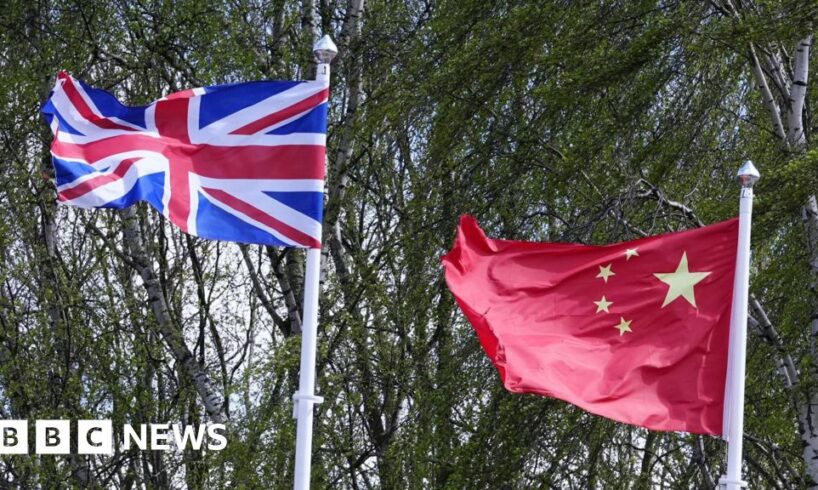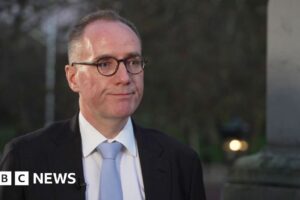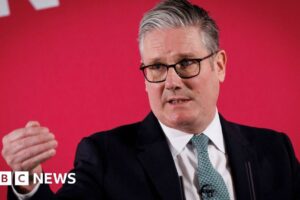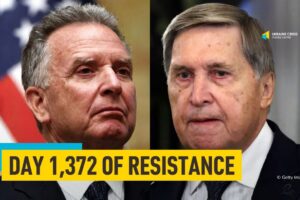
AFP/Getty Images
Christopher Cash (left) and Christopher Berry (right) were both accused of being Chinese spies
The government is facing questions after a case against two men accused of spying for China collapsed, just weeks before the trial was due to go ahead.
In September, prosecutors unexpectedly dropped the charges, sparking a political row over who was to blame.
The background to the case is complicated – so here we try and walk you through how we got here and the political impact.
What was the case about?
Christopher Cash, a former parliamentary researcher, and Christopher Berry – who have both consistently maintained their innocence – were charged under the Official Secrets Act in April 2024.
They were accused of gathering and providing information prejudicial to the safety and interests of the state between December 2021 and February 2023.
Why did it collapse?
Last week, the head of the Crown Prosecution Service (CPS) said the case collapsed because evidence could not be obtained from the government referring to China as a national security threat.
In a rare intervention, Director of Public Prosecutions Stephen Parkinson, who is the most senior prosecutor in England and Wales, said the CPS had tried to obtain further evidence from the government “over many months” but witness statements did not meet the threshold to prosecute.
He said while there was sufficient evidence when charges were originally brought against the two men in April 2024, a precedent set by another spying case earlier this year meant China would need to have been labelled a “threat to national security” at the time of the alleged offences.
However, some legal experts have questioned whether the CPS would have needed this evidence to go ahead with the prosecution.
What was the political fallout?
Downing Street has insisted the decision to drop charges was made by the CPS, with no minister, member of the government or special adviser involved.
The government has maintained that it is frustrated the trial collapsed.
Prime Minister Sir Keir Starmer has also sought to shift the focus to the previous Conservative government, which was in power when the alleged offences took place.
He argued the prosecution could only be based on the Tory government’s position at that time, when he says China was not designated a “threat to national security”.
Current Conservative leader Kemi Badenoch has rejected this, pointing to examples where Tory ministers and government documents had described China as a “threat”.
A number of former senior security and legal officials have also questioned the government’s argument.
The Tories have accused the government of refusing to give the CPS the evidence it needed to secure convictions.
They have suggested that the PM’s national security adviser Jonathan Powell, who has sought closer relations with Beijing, may have intervened.
The government has insisted Mr Powell, who is one of the PM’s most senior advisers and political allies, was not involved in any decisions about the evidence provided in the case.
It says deputy national security adviser Matthew Collins, a civil servant, provided witness statements for the government under both the Tories and Labour.
Security Minister Dan Jarvis told MPs Mr Collins was given “full freedom to provide evidence without interference” from ministers and special advisers, and that his evidence did not “materially change”.
Why is this a problem for the government?
Badenoch has accused the government of deliberately collapsing the trial because “the prime minister wants to suck up to Beijing” – something it has denied.
Since last year’s general election, Labour has sought closer trade ties with China to help achieve its aim of growing the economy.
Then-Foreign Secretary David Lammy, Chancellor Rachel Reeves and Powell have all visited the country over the past year.
The government has insisted its approach to China is rooted in the UK’s national interests.
However, Badenoch has claimed that following the collapse of the case it seems the PM has been “too weak to stand up to Beijing on a crucial matter of national security”.





